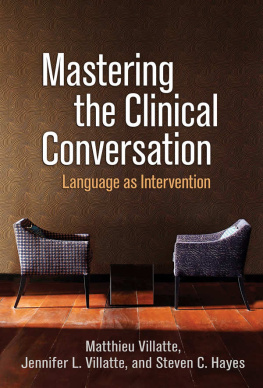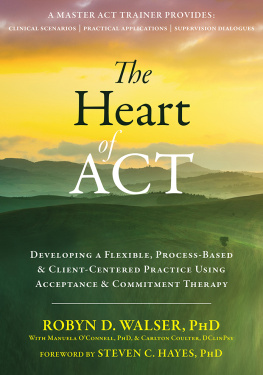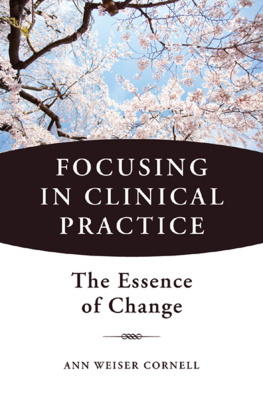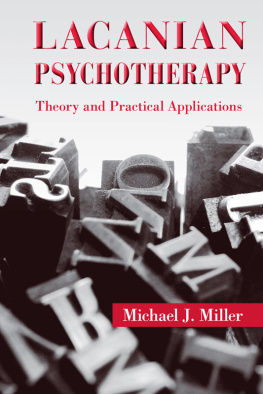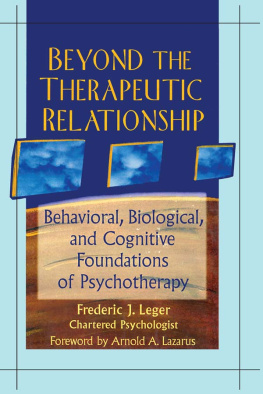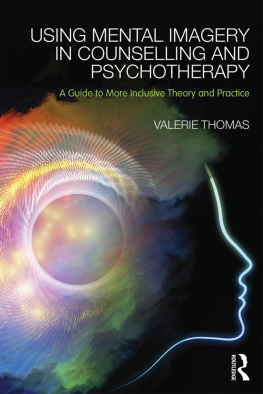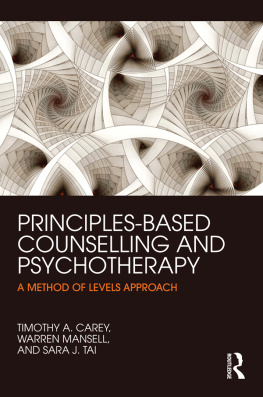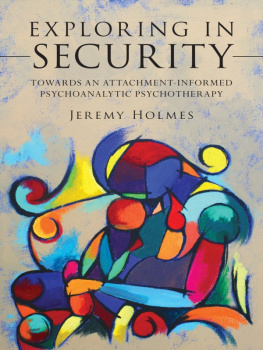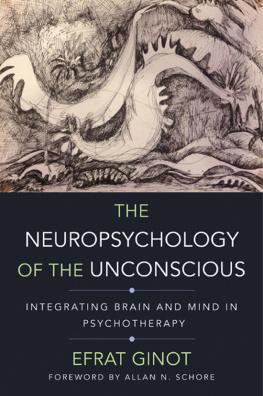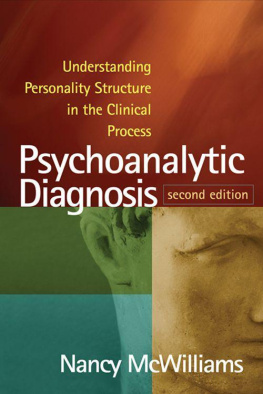Acceptance and Commitment Therapy:
The Process and Practice of Mindful Change, Second Edition
Steven C. Hayes, Kirk D. Strosahl, and Kelly G. Wilson
Mindfulness and Acceptance:
Expanding the Cognitive-Behavioral Tradition
Edited by Steven C. Hayes, Victoria M. Follette, and Marsha M. Linehan
Mastering the Clinical Conversation
Language as Intervention

Matthieu Villatte
Jennifer L. Villatte
Steven C. Hayes

THE GUILFORD PRESS
New York London
Epub Edition ISBN: 9781462523085; Kindle Edition ISBN: 9781462523092
Copyright 2016 The Guilford Press
A Division of Guilford Publications, Inc.
370 Seventh Avenue, Suite 1200, New York, NY 10001
www.guilford.com
All rights reserved
No part of this book may be reproduced, translated, stored in a retrieval system, or transmitted, in any form or by any means, electronic, mechanical, photocopying, microfilming, recording, or otherwise, without written permission from the publisher.
Last digit is print number: 9 8 7 6 5 4 3 2 1
The authors have checked with sources believed to be reliable in their efforts to provide information that is complete and generally in accord with the standards of practice that are accepted at the time of publication. However, in view of the possibility of human error or changes in behavioral, mental health, or medical sciences, neither the authors, nor the editors and publisher, nor any other party who has been involved in the preparation or publication of this work warrants that the information contained herein is in every respect accurate or complete, and they are not responsible for any errors or omissions or the results obtained from the use of such information. Readers are encouraged to confirm the information contained in this book with other sources.
Library of Congress Cataloging-in-Publication Data
Names: Villatte, Matthieu. | Villatte, Jennifer L. | Hayes, Steven C.
Title: Mastering the clinical conversation : language as intervention / by Matthieu Villatte, Jennifer L. Villatte, Steven C. Hayes.
Description: New York : The Guilford Press, [2016] | Includes bibliographical references and index.
Identifiers: LCCN 2015037310 | ISBN 9781462523061 (hardback)
Subjects: LCSH: Psychotherapist and patient. | PsychotherapistsLanguage. | Communication in psychiatry. | Psychotherapy. | BISAC: MEDICAL / Psychiatry / General. | SOCIAL SCIENCE / Social Work. | PSYCHOLOGY / Psychotherapy / General.
Classification: LCC RC480.8 .V55 2016 | DDC 616.89/14dc23
LC record available at http://lccn.loc.gov/2015037310
To my parents,
Michle and Jean Villatte
M. V.
To my partner in all things,
Matthieu
J. L. V.
To my wife and soul mate,
Jacqueline Pistorello
S. C. H.
Matthieu Villatte, PhD, is Research Scientist and Clinical Trainer at the Evidence-Based Practice Institute in Seattle. He has conducted workshops on the clinical applications of relational frame theory and contextual behavioral science in the United States, Canada, Australia, South America, and Europe. He is also an associate editor of the Journal of Contextual Behavioral Science. Dr. Villattes current work focuses on the dissemination of evidence-based practices, and he has published articles and book chapters on relational frame theory, contextual behavioral science, and experiential cognitive-behavioral therapy.
Jennifer L. Villatte, PhD, is a clinical psychologist committed to advancing health equity through contextual behavioral science. She is Assistant Professor of Psychiatry and Behavioral Sciences at the University of Washington, where she partners with innovators in computer engineering, human-centered design, and data science to maximize the effectiveness and reach of behavioral interventions that enhance individual and community well-being.
Steven C. Hayes, PhD, is Nevada Foundation Professor in the Department of Psychology at the University of Nevada, Reno. He has served as president of multiple scientific and professional organizations, including the Association for Behavioral and Cognitive Therapies and the Association for Contextual Behavioral Science. His work has been recognized by the Award for Impact of Science on Application from the Society for the Advancement of Behavior Analysis and the Lifetime Achievement Award from the Association for Behavioral and Cognitive Therapies, among other awards. The author of 41 books and over 575 scientific articles, Dr. Hayes has focused on understanding human language and cognition and applying this understanding to the alleviation of human suffering and the promotion of human welfare. His books include Acceptance and Commitment Therapy: The Process and Practice of Mindful Change, Second Edition, and Mindfulness and Acceptance: Expanding the Cognitive-Behavioral Tradition.
T he human species greatest advantage is its unique ability to wield the worlds most powerful tool: language. Our capacity to learn and thrive has grown exponentially with the acquisition of language and its related mental processes. Yet this power does not come without cost. Talking, thinking, and reasoning are at the core of many, if not most, psychological problems. That is part of why we call the behavioral problems we treat mental health problems.
This dual nature of language creates a unique problem for psychotherapists, as language is also at the core of most psychological treatments. Many of the therapy techniques aimed at changing our words and thoughts have unintended, even paradoxical, results. Beliefs and memories tend to persist even in the face of contradictory evidence and a sincere desire to change them. Even if we can beat back troublesome thoughts, placing mental content at the forefront of the battle often reinforces its importance and influence over our lives. These battles leave both clients and therapists exhausted and discouraged. How can psychotherapists alleviate the suffering caused by language and cognition through the use of language and cognition? This book represents an alternate approach, where clinicians disengage from the struggle and help clients harness the power of language to promote psychological resilience and flourishing.
Many psychotherapy manuals function like recipe collectionsstep-by-step procedures that cooks of all skill levels can follow in order to produce a specific outcome. They are quick and easy to use, produce generally consistent results, and reduce the risk of user error by requiring relatively little input or decision making. Cookbooks have their use, but another approach is possible. Master chefs can innovate on the spot and be confident that they will achieve their desired results because their actions are based on well-tested principles. They can modify recipes and substitute ingredients based on the resources available in their current cooking environment and the personal preferences of the people they are serving. They can also adapt a recipe to their own style, emphasizing their unique strengths and creating a more personal experience for their clients.
One thing that has been missing from psychotherapy development and training is a set of solid behavioral principles that show clinicians how to masterfully wield their most essential toollanguageand turn the clinical conversation into a haven for healing. We believe the time has arrived to explore the potential of relational frame theory (RFT) to provide a way out of this seemingly unwinnable battle. Rather than waging war on language or simply ignoring that our primary weapon can cause unintentional damage, RFT provides guidelines for using language therapeutically. No need to give up the benefits of language. No need to sacrifice our clients flourishing and vitality as collateral damage.
Next page
